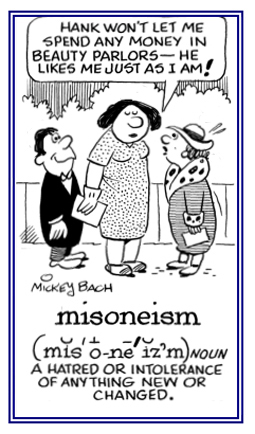-ism, -ismus
(Greek, ismos; Latin, ismus: a suffix: belief in, practice of, condition of, process, characteristic behavior or manner, abnormal state, distinctive feature or trait)
micropterism
A political orientation of a people or a government to maintain a strong armed force and to be prepared to use it aggressively to defend or to promote national interests: "The government policy of militarism against foreign attacks involved strengthening the armed forces to defend the country."
Soldiers usually win the battles and generals get the credit for them.
millienarianism
minimism
1. An intolerance of anything that is unfamiliar or someone who is against having any new trends or changes: One example of misoneism has been shown by Hans who always went out to eat with his wife only at a German restaurant where he always ate "Schnitzel" with sauerkraut; and he never went to Mexican, Chinese, or any other foreign restaurants because he always felt that the food was too strange for him to consider.
2. Etymology: from Greek miso-, "hate" + neos, "new".

© ALL rights are reserved.
Go to this Word A Day Revisited Index
2. Etymology: from Greek miso-, "hate" + neos, "new".

Go to this Word A Day Revisited Index
so you can see more of Mickey Bach's cartoons.
A disrespect for the Holy Father or of the gods of religious groups: With all the wars and conflicts continuing in the world and no end in sight, it would be no wonder that some people might develop misotheism, losing faith in the doctrines of their churches and having a sense of irreverence towards divinities who allow such atrocities to exist.
We have just enough religion to make us hate, but not enough to make us love one another.
modalism
1. The theological doctrine that the members of the Trinity are not three separate persons but modes or forms of God’s self-expression.
2. The belief that the Heavenly Father, the Resurrected Son, and the Holy Spirit are different modes or aspects of one God, as perceived by the believer, rather than three distinct persons in God Himself.
2. The belief that the Heavenly Father, the Resurrected Son, and the Holy Spirit are different modes or aspects of one God, as perceived by the believer, rather than three distinct persons in God Himself.
modernism
1. Practices which are typical of contemporary life or thought; modern thought, character, or practice.
2. The quality of being current or in the present time with one's behavior or actions.
3. Sympathy with, or conformity to, modern ideas, practices, or standards.
4. A peculiarity of usage or style, as with words or phrases, which is characteristic of modern times.
5. Etymology: "of or referring to present or recent times"; from Middle French moderne, from Late Latin modernus, "modern"; from Latin modo, "just now, in a (certain) manner".
2. The quality of being current or in the present time with one's behavior or actions.
3. Sympathy with, or conformity to, modern ideas, practices, or standards.
4. A peculiarity of usage or style, as with words or phrases, which is characteristic of modern times.
5. Etymology: "of or referring to present or recent times"; from Middle French moderne, from Late Latin modernus, "modern"; from Latin modo, "just now, in a (certain) manner".
monarchism
The principles of monarchical government; attachment to monarchy or the monarchical principle.
1. A lack of belief in the existence of just one God or a god.
2. The doctrine or belief that there is not one God alone.
2. The doctrine or belief that there is not one God alone.
monism
1. In philosophy, the view that seeks to explain all sorts of phenomena with the
assumption that there is only one absolute substance, element, or principal.
2. A theory or point of view that attempts to explain everything in terms of a single principle.
3. The conception that there is one causal factor in history and the notion of a single element as the primary determinant of behavior, social action, or institutional relations.
2. A theory or point of view that attempts to explain everything in terms of a single principle.
3. The conception that there is one causal factor in history and the notion of a single element as the primary determinant of behavior, social action, or institutional relations.
monodactylism
Characteristic of someone, or an organism, having just one finger, toe, or claw.
monodiabolism
monomorphism
Possession of a single body form throughout the life cycle.
The theory, or theories, that all souls (or the souls of all mankind) are one: "There is a unity of souls of all humans according to this concept of monopsychism."


